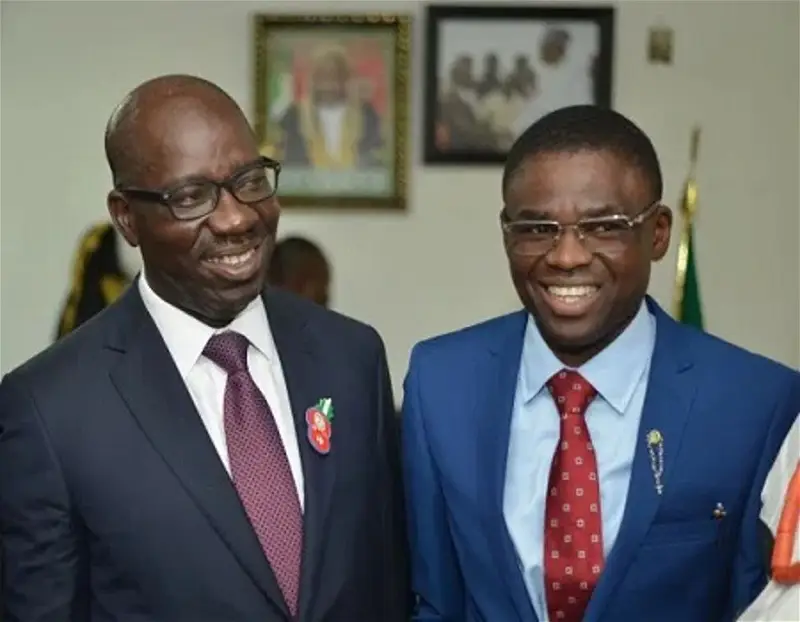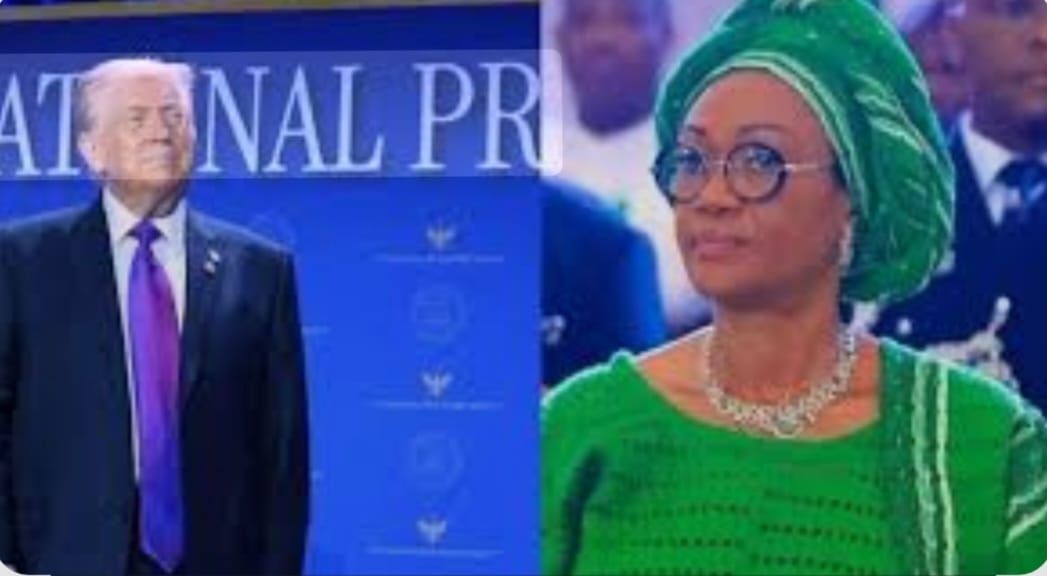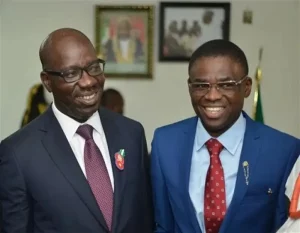Politics
Alleged ‘Coup’ Against Obaseki: My Story Says Deputy Governor, Shaibu

Alleged ‘Coup’ Against Obaseki: My Story Says Deputy Governor, Shaibu
Less than 24 hours after Edo State governor, Godwin Obaseki, opened up on the crisis between him and his deputy, Comrade Philip Shaibu, the latter has said his boss is a victim of political jobbers.
He said there is no rift between him and the governor, describing reports to that effect as the imagination of the fifth columnist.
Obaseki had accused Shaibu of working against his interest, describing the situation as a “coup” against him.
He made the allegation in Jattu during a meeting with elders and leaders from Etsako West, East and Central Local Government Areas of the state.
The governor said: “My deputy called the leader in APC, telling that leader that during the elections on the next day, particularly the Speaker of the House of Assembly, that he has five members who are loyal to him and that he would like the seven members of APC to work with his five members of PDP to produce the next speaker.
“As far as I am concerned, that was not working in our common interest.
“Why would the deputy governor seek to have another speakership candidate outside of what the governor wants? Are we working together?
“That was when I knew we had a problem. The deputy governor has become so desperate to take over. He would do anything, including carrying out a coup.”
But Shaibu while briefing his aides, yesterday, dismissed the allegations as baseless, saying they are malicious attempts by those he described as political jobbers hell-bent on misleading the governor.
He said the aim of those behind the development is to damage his reputation and sow seeds of discord between him and the governor.
According to Shaibu, political jobbers sold the coup dummy to the governor whom he referred to as his ‘elder brother’ to provoke more crises so they could profit from it.
He said it is preposterous to contemplate a coup against a man who has given him so much latitude to operate.
Shaibu reiterated his unwavering loyalty to Governor Obaseki and the Peoples Democratic Party,PDP, PDP, adding that it is a privilege to serve as Obaseki’s deputy in the last seven years.
“Governor Obaseki and myself are committed to the continued development of Edo State. We are united in our determination to build a prosperous and inclusive society. I call on all well-meaning individuals to reject these divisive narratives and join in the quest to transform Edo State into a model of sustainable development and good governance. Edo State PDP politicians should embrace peace and seek unity to fight the common enemy,” one of his aides who was at the meeting quoted him as saying.
He said: “Any insinuation that he harbours ulterior motives or seeks to undermine the governor’s leadership is nothing short of a fabrication.
“I have consistently advocated for policies and initiatives that align with this administration’s goals and aspirations. It is disheartening to see such baseless allegations being propagated, as they only serve to distract the administration from its primary objective of serving the people of Edo State.”
The deputy governor urged the media and the public to approach these allegations with scepticism, while he encouraged all to focus on the issues that truly matter to the people of Edo State.
Shaibu said he remains an unrepentant democrat who believes in the democratic process and respects the mandate given to Governor Obaseki and himself by the people of Edo State.
He said the allegation that he would consider a ‘coup’ to overthrow a democratically elected government is not only absurd but also deeply offensive.
Meanwhile, fresh facts emerged at the weekend that contrary to earlier allegations, the deputy governor did not refuse to join the governor in the selection of commissioners in Etsako.
According to a top PDP source from the state, the governor had on that day sent his deputy to proceed to Edo North to resolve some political issues.
The source said:”He was on his way when the Chief of Staff to the governor called that the governor needed his attention in Benin.
“The deputy allegedly told the CoS to inform the governor that he was already close to Afuze axis to address the issue he directed him to do. The governor allegedly acknowledged this call.
“The appointment of political office holders is the prerogative of the governor. Therefore, if a governor decides to allow his deputy to nominate candidates to fill any position, it is a privilege. But political jobbers who also include hack writers have generated more lies from the pit of hell, saying that Rt. Hon. Comrade Philip Shaibu has perfected plans to rejoin the All Progressives Congress, APC, next week. There is no iota of truth in this.
“To further put a lie to this, the spin doctors claimed that the APC National Working Committee, NWC is set to receive him in Abuja. The question here for the discerning minds is that, is it the NWC of a party that receives a decamped into the party? Shaibu has never minced words, vowing to sink and swim with his principal, Governor Godwin Obaseki. This, he has said severally at public fora.
“These evil men have come up with unbelievable accusations like coming late to state Executive Council meetings, attempting to slap the Secretary to the State Government, being the brain behind feuds between Comrade Adams Oshiomhole and the governor as well as befriending Nyesom Wike and Dan Orbih among others.
“In view of this, I plead with these characters bent on driving a wedge between Comrade Philip Shaibu and his boss, Governor Godwin Obaseki, to put the Edo project and the people far above their own selfish interests.’’
The frosty relationship between the duo came to the limelight following Shaibu’s suit at the Federal High Court, Abuja, where he sought to prevent an alleged impeachment plot
Shaibu, in an ex parte motion filed on July 28, asked the court to restrain the defendants from preventing him from carrying out his role as deputy governor.
According to the court documents, the Inspector-General of Police, state security service, governor of Edo, Speaker of Edo State House of Assembly, and Chief judge of Edo State, were listed as 1st to 5th defendants respectively.
The deputy governor asked the court to restrain the governor, the Speaker of the state assembly and the Chief Judge, from “initiating impeachment proceedings or sanctioning any impeachment” against him. Shaibu
Politics
OGUN VISIONARIES READY TO HOLD SECOND EDITION OF TOWN HALL MEETING IN IJEBU ODE

OGUN VISIONARIES READY TO HOLD SECOND EDITION OF TOWN HALL MEETING IN IJEBU ODE
As part of its commitment to participatory democracy, Ogun Visionaries for Yayi has announced plans to hold the second edition of its Town Hall Meeting on Thursday, 12th February, at RONTEX Hall Events Centre, opposite the Old Burial Ground, Ibadan Road, Ijebu-Ode, Ogun State. The event is scheduled to commence at 11:00 a.m.
This was disclosed in a press release signed by Hon. Monsur Oloyede, Chairman of the Planning Committee, who assured that the programme would be one of the best town hall engagements organised by the group.
According to him, the town hall meeting is aimed at bringing together the people of Ogun State—particularly stakeholders from Ogun West—to further enlighten and mobilise support for the 2027 gubernatorial ambition of Senator Solomon Adeola (Yayi).
The Honourable Minister of Health, Dr. Adekunle Isiaq Salako, will serve as Chairman of the Occasion, while Dr. Fatimat Oluwakemi Binta Shoge will be the Chair person
The. Mother of the Day is Otunba Dr. Aderonke Kolade Cairo, the Eeta Iyalode Bobakeye Obinrin Akileand Grand Matron of Ogun Visionaries.
The Keynote Address will be delivered by Rt. Hon. Tunji Egbetokun, former Speaker of the Ogun State House of Assembly, while Hon. Onadeko Onanusi, former Member of the House of Assembly, will serve as Guest Speaker.
The Royal Fathers of the Day are:
Oba Adedotun Odunneye Odusanya, JP, Osijiya II, Olu of Odonselu, Alaro Kingdom, Ijebu and Oba Kazeem Adesina Salami, Ilufẹmiloba I, Osobia, Paramount Ruler of Makun-Omi.
Dr. Niyi Osoba will also feature as Speaker of the Day.Chief Segun Ojolowo Ojuko
The Ogboye of Ota Aworiland
Fmr SSA on housing to Ogun State also will deliever speech that day
Discussants for the programme include Hon. Tola Banjo, Olootu Bolaji Adeniji, and Princess Florence Feyikemi, while Chief Ajiroba Dapo Oke, Register Tai Solarin federal University of education Ijagun, will serve as Chief Reviewer/Rapporteur
The Director-General of Ogun Visionaries for Yayi, Hon. Odunleye Odunjo, will be the Chief Host of the event.
Politics
Trump’s Recognition of Remi Tinubu at U.S. National Prayer Breakfast

Trump’s Recognition of Remi Tinubu at U.S. National Prayer Breakfast
By George Omagbemi Sylvester | Published by SaharaWeeklyNG
“Soft Power on a Global Stage: The Symbolism Behind Trump’s Acknowledgment of Oluremi Tinubu in Washington.”
In the often-ceremonial but politically symbolic arena of international diplomacy, moments of public recognition can carry deeper meaning than their brief appearances suggest. Such was the case at the 74th U.S. National Prayer Breakfast in Washington, D.C., where United States President Donald Trump publicly acknowledged Nigeria’s First Lady, Senator Oluremi Tinubu, describing her as a “very respected woman” and highlighting her role as a Christian pastor. The brief recognition, delivered before a global audience of political and religious leaders, has since generated attention in diplomatic and media circles. It was more than a passing courtesy; it represented a convergence of religion, diplomacy and global optics at a time when the relationship between Washington and Abuja is being redefined by security concerns, religious freedom debates and geopolitical interests.
The Moment in Washington. During his remarks at the annual gathering, President Trump paused to draw attention to the Nigerian First Lady seated among the guests. He said: “We are honoured to be joined today by the First Lady of Nigeria, a very respected woman.” The audience responded with applause as the American president acknowledged her presence, noting her pastoral role in one of Nigeria’s largest Christian denominations. The National Prayer Breakfast, held each February in Washington, is a longstanding tradition that brings together U.S. lawmakers, international dignitaries, religious leaders and policymakers for reflection on faith, leadership and public service. For decades, the event has served not only as a spiritual gathering but also as an informal diplomatic forum, where leaders from around the world interact with American officials in a setting removed from the rigid protocols of formal state visits.
Understanding the National Prayer Breakfast.
The U.S. National Prayer Breakfast dates back to the Eisenhower era and has evolved into a major international gathering that blends religion and politics. It is attended annually by members of Congress, presidents, diplomats and religious leaders from various nations. Political scientist Samuel Huntington once observed that “religion and politics remain the most powerful forces shaping human identity and conflict.” While Huntington’s work focused on civilizations and global conflict, the prayer breakfast represents the softer side of that intersection and religion used as a tool for dialogue, diplomacy and symbolic unity. Similarly, Harvard scholar Joseph Nye, known for his concept of “soft power,” argues that influence in international relations is often achieved through attraction and values rather than coercion. In that sense, events like the National Prayer Breakfast are instruments of soft power, projecting moral leadership and fostering personal relationships among global elites. Mrs. Tinubu’s presence at such an event placed Nigeria within this subtle but influential arena of faith-based diplomacy.
The First Lady’s Religious and Political Profile.
Senator Oluremi Tinubu is not only Nigeria’s First Lady but also a former three-term senator and an ordained pastor in the Redeemed Christian Church of God, one of Nigeria’s largest Pentecostal denominations. Her dual identity as both a political figure and religious leader makes her presence at a faith-based diplomatic event particularly significant. It allowed Nigeria to be represented not just politically but also spiritually, aligning with the event’s core theme of faith in public life. In diplomatic terms, first ladies often play a quiet but influential role in shaping perceptions of their countries abroad. From Eleanor Roosevelt’s human rights advocacy to Michelle Obama’s global education campaigns, the soft-power impact of first ladies has historically been substantial. Mrs. Tinubu’s recognition in Washington fits into this tradition, positioning her as a symbolic ambassador of Nigeria’s religious and cultural identity.
Diplomatic Context: U.S.-Nigeria Relations.
The recognition comes at a time when relations between Nigeria and the United States have been shaped by security cooperation, counter-terrorism efforts and debates over religious freedom. Reports indicate that the event took place against the backdrop of heightened American concern about the treatment of Christians in Nigeria, an issue that has periodically influenced U.S. policy toward the country. At the same time, both nations have deepened security cooperation against extremist groups, reflecting shared strategic interests in combating terrorism across West Africa. In this context, Trump’s public praise of the Nigerian First Lady could be interpreted as both a diplomatic gesture and a signal of continued engagement between the two countries.
Symbolism and Soft Power.
Diplomatic recognition at international gatherings is rarely accidental. Even brief acknowledgments can carry layers of meaning. First, it signals respect and recognition of Nigeria’s leadership. Second, it places Nigeria in a global conversation about faith, governance and moral leadership. Third, it reflects the enduring importance of religion in international relations, especially between nations with strong religious populations. Nigeria, often described as one of the most religious countries in the world, occupies a unique position in global faith politics. With large Christian and Muslim populations, its internal religious dynamics frequently attract international attention. By highlighting the First Lady’s pastoral background, Trump’s remarks implicitly acknowledged Nigeria’s deep religious culture and the role of faith in its public life.
Reactions and Interpretations.
Media reports across Nigeria described the moment as one that placed the First Lady among prominent global faith leaders attending the event.
Some analysts see it as a routine diplomatic courtesy, while others interpret it as a sign of warming relations or a strategic nod to Nigeria’s importance in Africa. Diplomatic scholar Madeleine Albright once wrote that “symbolism is the currency of diplomacy.” In this sense, the recognition of Mrs. Tinubu was not merely a personal compliment but a symbolic gesture toward Nigeria itself.
Religion and Global Politics.
The intersection of religion and politics is not new. From the Vatican’s diplomatic influence to the role of evangelical movements in American foreign policy, faith has long shaped international relations. The National Prayer Breakfast embodies this intersection. It provides a stage where leaders speak the language of faith while engaging in informal diplomacy. For Nigeria, a country where religion deeply influences politics and society, participation in such events reinforces its global religious identity.
The Optics of Leadership.
In international politics, perception often matters as much as policy. Images of leaders being recognized on global stages can shape public opinion and national morale. For supporters of the Tinubu administration, the recognition may be seen as a sign of international respect and acceptance. For critics, it may be viewed as a symbolic gesture with little practical impact on Nigeria’s economic or security challenges. Either way, the moment underscores how international optics continue to play a powerful role in domestic political narratives.
A Moment Beyond Ceremony.
While the National Prayer Breakfast is primarily a spiritual and ceremonial event, it often carries deeper diplomatic implications. Trump’s recognition of the Nigerian First Lady placed Nigeria momentarily at the center of a global stage, reinforcing its presence in conversations about faith, governance and international cooperation. It also highlighted the enduring role of religion as a bridge in international relations, an arena where shared beliefs can foster dialogue even when political differences remain.
Summative: Symbolism, Diplomacy and the Power of Recognition.
In the theatre of global diplomacy, moments of recognition (no matter how brief) can carry enduring symbolic weight. President Trump’s acknowledgment of Senator Oluremi Tinubu at the U.S. National Prayer Breakfast was one such moment: simple in delivery, yet layered in meaning. It reflected the intersection of faith and politics, underscored Nigeria’s place in global religious diplomacy and signaled a gesture of respect between two nations bound by complex ties of security, culture and shared values. Whether viewed as routine courtesy or strategic symbolism, the moment illustrated a fundamental truth of international relations: influence is not always exercised through treaties, sanctions or military power. Sometimes, it is conveyed through words spoken across a room, applause from an audience and the quiet power of recognition. As Joseph Nye reminds us, the most effective power is often the power to attract and inspire. In Washington that morning, Nigeria found itself, however briefly, within that sphere of global attention, proof that in diplomacy, even the smallest gestures can echo across borders.
Politics
Ajadi Felicitates Olooye Adegoke On Birthday …Says His Philanthropic Nature Is Worthy Of Emulation

Ajadi Felicitates Olooye Adegoke On Birthday …Says His Philanthropic Nature Is Worthy Of Emulation
A leading Peoples Democratic Party, (PDP) gubernatorial aspirant in Oyo State, Ambassador Olufemi Ajadi Oguntoyinbo has felicitated the Aare Egbe-Omo Balogun of Ibadanland, Olooye Adegboyega Taofeek Adegoke (FCA) as he marked his birthday on Wednesday, February 4, 2026, describing him as a peace loving and one whose life is dedicated to helping the needy.
Ajadi, in a display of politics without bitterness, said that though Olooye Adegoke is also aspiring to become the governor of Oyo state, he has identified his philanthropic activities which he said showed him as a selfless politician.
In a statement he personally signed on Wednesday, Ajadi said that Olooye Adegoke as a fellow Ibadan man, and a person on the Olubadan lineage, he cherished his intellectual background and humility.
According to the statement, “I felicitate with my elder brother, a fellow of the Institute of Chartered Accountants of Nigeria (ICAN) and an Ibadan traditional Chief, Olooye Adegboyega Taofeek Adegoke on the occasion of his birthday.
“Though we are both aspiring to be the governor of our dear State, Oyo and we are in the same party, as an Apostle of politics without bitterness, I congratulate Olooye Adegoke on his birthday.
“I wish him more years in good health and in the service of Ibadanland and Oyo State in general.
“I have watched with utmost interest and I discovered that the philanthropic activities of Olooye Adegoke tally with my belief that those that have should cater for the less privileged in the society.
“I pray that God will continue to provide for him as he continues to dedicate his life towards making the downtrodden to live good lives.”
-

 celebrity radar - gossips6 months ago
celebrity radar - gossips6 months agoWhy Babangida’s Hilltop Home Became Nigeria’s Political “Mecca”
-

 society6 months ago
society6 months agoPower is a Loan, Not a Possession: The Sacred Duty of Planting People
-

 news6 months ago
news6 months agoTHE APPOINTMENT OF WASIU AYINDE BY THE FEDERAL GOVERNMENT AS AN AMBASSADOR SOUNDS EMBARRASSING
-

 Business6 months ago
Business6 months agoBatsumi Travel CEO Lisa Sebogodi Wins Prestigious Africa Travel 100 Women Award









